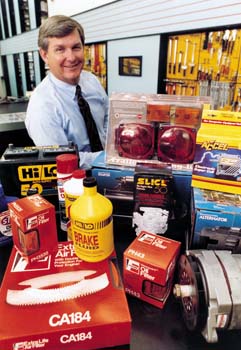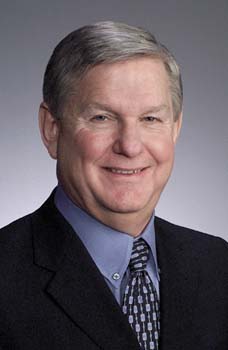
and now the president and CEO of Metal
Supermarkets International, T. Michael
Young delivered the keynote speech for
WSU’s Business Week 2003.
The 2002 downfalls of Enron, Arthur Andersen — one of the country’s top public accounting firms — and WorldCom, the nation’s second-largest long distance carrier, jolted many in the business world.
Yet in the wake of these corporate collapses, a number of business experts manage to maintain what might be needed most — pragmatic optimism.
One such person is T. Michael Young ’67, president and CEO of Metal Supermarkets International, who delivered the keynote address, “Ethics, Accountability and Corporate Governance after Enron,” this March during Business Week 2003, a five-day marathon of lectures, discussion panels and presentations sponsored by WSU’s Barton School of Business.
Young, who began his career with Arthur Andersen after graduating from WSU, left the company as a partner in 1980 to move on to other endeavors.
“Enron,” he says, “was built on a poor foundation of ethics, and ethical problems can start small. You can’t audit conflicts of interest — like requiring employees to book flights through Kenneth Lay’s sister’s travel agency. Arthur Andersen was different. I don’t believe there was an unethical situation involved, but that the company lost sight of its stock shareholders.”
Despite the business scandals and failures of the past year, Young feels this is still a good time for business. “We’ll bounce back,” he stresses. “Crises have happened before. Unfortunately, they will happen again.”
One early crisis occurred in Holland in 1630 in what is now known as “The Dutch Tulip Scandal,” where the price of a Semper Augustus tulip bulb sold for as high as 30 times an individual’s average income. A crisis such as that, Young explains, is the result of financial euphoria.
“What happens is a dramatic price increase in ‘something’ and speculation builds its own momentum,” he says. “The participants are people who have figured out there’s a new world order, but assume they’re going to know when to get out. The current problem was based on a new economy — a ‘wired world’ with such things as dot.coms.
During this time, there was pressure on CEOs to participate in the new economy. There was pressure to get stock prices up and to have earnings go up through sales and creative accounting.”

Sadly, some CEOs responded unethically to such pressures.
Young stresses that poor ethical behavior does not necessarily begin with flagrantly wrong actions — as in the case of Enron’s use of airplanes — but can start on a small, seemingly innocuous level, and he cites as an example: “We have companies out there who allow the use of unlicensed software. I will say this: any CEO or CFO who tolerates this is setting the wrong ethical tone for the company.”
While the CEO sets the overall tone, corporate success is dependent on the ethical and productive behavior of every employee.
“A person just entering their field should know: ‘You are responsible,’” Young says, adding that job hunters need to make a point of searching out businesses that are built on firm ethical foundations, which means, in part, having a good sense of the CEO’s ethics.
And if, for whatever reason, they should find themselves working for a company with questionable ethics, Young has some crystal clear advice: “Get out.”





